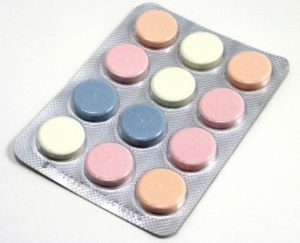Heartburn, Reflux, & GERD
Updated Feb. 2019
Heartburn, Reflux, GERD
One estimate is that 40% of the US population has some degree of esophageal reflux, with 20% of adults complaining of weekly episodes of heartburn and 7–10% complaining of daily symptoms. Esophageal reflux occurs when the lower esophageal sphincter malfunctions, allowing the backward flow of acid, bile, and other contents from the stomach into the esophagus. Reflux can result from gastritis (inflammation of the stomach itself), peptic or duodenal ulcers, a hiatal hernia, or even the chronic use of NSAIDs.
GERD (gastroesophageal reflux disease) can cause esophageal scarring or Barrett’s syndrome, a chronic esophageal irritation that causes normal cells to be replaced by precancerous ones. An endoscopy test is used to diagnose GERD. Conventional treatment usually involves H2 antagonists (such as Tagamet, Pepcid, Zantac, or Axid) and antacids (such as Tums or Maalox) as the first line of treatment. Proton-pump inhibitor drugs (such as Nexium, Prevacid, or Prilosec) might also be initiated.
Are antacids the answer?
No! These medications block the absorption of nutrients like zinc, folic acid, B12, calcium, and iron. This can lead to fatigue, anemia, and depression. And long-term use of these medications can block all stomach acid.
Your body needs acid!
The esophageal sphincter is stimulated to close by the release of stomach acids. Picture the esophageal sphincter as being a door that separates our esophagus (throat) from our stomachs. The door is opened by the food we take in and closed when the naturally occurring stomach acid is released. When there’s not enough acid present—because antacids have neutralized them—the esophageal sphincter may not close properly, allowing acid to travel back up into the esophagus and cause heartburn. Ironic, isn’t it? Antacids can actually make heartburn worse.
The stomach needs acid to break down proteins for digestion. No protein digestion means no amino acids. No amino acids means no neurotransmitters (serotonin, dopamine, norepinephrine, etc.). This can lead to all sorts of problems including: intestinal permeability, anemia, fatigue, brain fog, chronic pain, weak nails, hair loss, cold hands and feet, increased allergy disorders, depression, anxiety, and bacterial and yeast overgrowth.
An acidic environment is one of the body’s first lines of defense, destroying viruses, parasites, yeast, and bacteria.
Protocol for Low Stomach Acid
If you’re suffering from heartburn, reflux, GERD, bloating, gas, IBS, or unwanted health issues, low stomach acid is most likely the problem. Try these solutions rather than antacids:
• Take a digestive enzyme with each meal. If you’ve been taking Nexium, Prevacid, Pepcid, Prevpac, Prilosec, Propulsid, Reglan, or Zantac for over three months, then you may have to stay on the medication as you begin the digestive enzyme. But many of my patients have found that they don’t need these prescription medications once they start taking a good high-potency digestive enzyme. Still, don’t discontinue any prescription medication without consulting your medical doctor first.
Click here to learn more about the enzymes I recommend for my patients here.
I recommend my patients use a potent 8X (double the strength of most) pancreatic digestive enzyme formula that utilizes USP porcine-derived high-potency pancreatin for reliable and consistent enzyme activity.
Learn more about the enzymes I recommend for my patients here.
Avoid foods that can relax the esophageal sphincter and make heartburn, reflux, and GERD worse. These include fried, spicy, or fatty foods; carbonated drinks; citrus fruits; peppermint; chocolate; coffee; tea; alcohol; tomatoes; garlic; and onions.
Avoid lying down for at least three hours after you finish eating. When you do lie down, try elevating the head of your bed about six inches (to facilitate keeping the gastric contents in the stomach). You can also try sleeping on your side, which would remove pressure from the esophageal sphincter, helping to keep gastric contents from backing up into your esophagus.
Try to eat smaller meals, and more frequently (perhaps four or five in a day).







hi Dr. Murphree.
i have fibromyalgia and cfs since 2007.
i want to know is it trut if i have dose illness i have lyme diseese and i need get treatmeant for lyme disees and my fibro and cfs get treatetet?
sincerly samira
I’m sorry you’re feeling lousy.
Lyme doesn’t cause fibromyalgia. You should go to Dr. Murphree’s you tube channel and learn more about his protocols.
FFC Grad- June 2017
(Fibro Free Coaching Program)